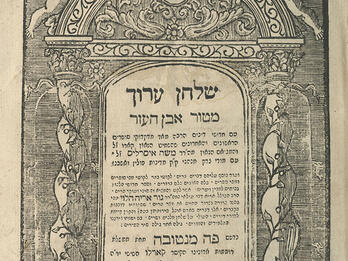Shulḥan ‘arukh (Set Table): Introduction
Introduction
These are the words of the insignificant man, Joseph Karo, son of the great R. Ephraim, son of the great R. Joseph Karo, may he be remembered for the life of the world to come.
I shall render most abundant thanks to the Almighty with my mouth, and praise Him amidst the multitudes, and glorify Him with my chant. With what shall I come before the Lord, and bow myself unto the God on High (Micah 6:6), Who, from His holy habitation, from heaven [see Deuteronomy 26:15], has shone forth in the abundance of His mercy and His grace, and caused a flow of His goodness to fall upon the lowliest of men, such as myself, to enable me to compile a work offering goodly words, this vast compilation composed by me on the Arba‘ah turim [of Jacob ben Asher (1269–1343)], which I entitled Bet Yosef [The House of Joseph]. I have incorporated in it all the laws to be found throughout the works of all the poskim [halakhic decisors], both recent and ancient, together with their sources in the Babylonian and Palestinian Talmuds, Tosefta, Sifra, Sifre, Mekhilta, the statements of the commentators and the decisors, and the authors of responsa, both recent and ancient. Each law was duly explained in its proper manner with the utmost clarity—and the edifice rested firmly upon its foundations, upon which were hanging all the spiritual armor of the mighty men [see Song of Songs 4:4], those heroes of renown from days of yore [see Genesis 6:4].
I considered it to be beneficial to collect the lilies encapsulated within words [of the author of the Turim], and the sapphires contained within his statements, expressing them in an abridged form, in articulate and comprehensive language, of an elegant and pleasing kind, in order that the perfect Torah of the Almighty will be fluent within the mouth of every single Jew. Thus, when people inquire as to a point of halakhah from any talmudic scholar, he will not stutter haltingly in regard thereto, but will be able to say unto wisdom You are my sister! (Proverbs 7:4)—in the same way as it is plain to him that his sister is [sexually] prohibited to him, so too will every law on which he is consulted in regard to practical halakhah be manifestly clear to him [see b. Shabbat 145b] once this work—constructed as a stronghold, a veritable mound unto which all turn [see Song of Songs 4:4; b. Berakhot 30a]—has become entirely familiar to him. [This goal can be achieved] by virtue of its division into thirty sections, so that one section may be studied on each day of the month, with the result that his learning gets reviewed on a monthly basis, and thus it may be said of him: “Happy is he who has come here [to the celestial abodes] with his learning in hand [see, e.g., b. Pesaḥim 50a].” Not only this, but there is also the fact that the junior students can constantly be perusing it and repeating its phraseology by rote, and the learning they imbibe from their childhood will be well ordered in their mouths from their youth onward in the form of practical halakhah, and even in their old age, they will not deviate from it [see Proverbs 22:6]. And the enlightened shall shine as the brightness of the firmament when they obtain respite from their sorrows and the labor of their hands [see Genesis 5:29]; their souls will derive pleasure when they meditate in this work which is full of delight, consisting of decided halakhah without speech and words [of dispute; see Psalms 19:4].
And I have entitled this work Shulḥan ‘arukh [Set Table], as within it, one who studies it intently will discover all manner of savory dishes, comprehensively set in order and well preserved, appropriately arranged and clear. And I feel assured that, by the grace of the Almighty, the earth will be filled with knowledge of the Lord [see Isaiah 11:9] through the medium of this work—both the small and the great, the student and the expert, the cunning charmer, and the skillful enchanter (Isaiah 3:3). And accordingly, I spread forth my hands unto the Lord that He may assist me for the sake of His glorious Name, to be one of those who turn the many to righteousness, and that He may grant me the merit of being properly organized in regard to my work, from start to finish—correct and acceptable, fine and beautiful—and I hereby commence carrying out that which I have designed, and may the Lord be my help!
Credits
Published in: The Posen Library of Jewish Culture and Civilization, vol. 5.




